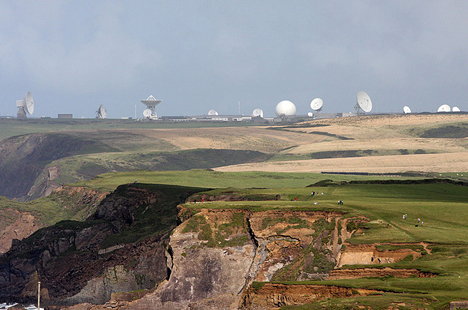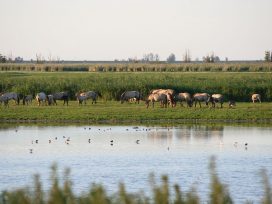In June 2013, Edward Snowden began to uncover the machinations of the US National Security Agency (NSA) and the British Government Communications Headquarters (GCHQ), prompting a worldwide debate about the alarming power of the secret services. Snowden laid bare the extent to which the quintet of secret services – the “Five Eyes” from the United States, the United Kingdom, Canada, Australia and New Zealand – had spied on citizens around the world, and the planetary system in place for stealing, storing and using data for their own purposes – thus violating everyone’s privacy, which Article 12 of the United Nations Charter on Human Rights protects. As a result, freedom of expression, the basis for political participation as well as of resistance against power, was fundamentally threatened and with it, democracy as such.

GCHQ Bude, formerly called the Composite Signals Organisation Station Morwenstow, located on the north Cornwall coast at Cleave Camp, UK. Photo: PeterJDH. Source: Flickr
The secret services justify their activity, be it the acquisition of knowledge from the planetary cloud, from the encrypted mobile phones of government chiefs such as Angela Merkel or Dilma Rousseff, or from the mass of (un)encrypted emails of ordinary citizens, with the flimsy argument that it is geared toward the early recognition of terrorist activities and, therefore, a matter of public order and security. However, the worldwide spying operation is more than a gigantic trawl through the World Wide Web in the name of security. Rather, it perfectly matches the patterns of thinking and acting as dictated by the geo-engineering of a new epoch in human history. A “planetary stewardship”, the efficient management of life on planet Earth, is administered using sophisticated technologies, in order to channel not merely information flows but other diverse crises of our time and associated processes – all for the purpose of maintaining the ruling capitalist system.
That data theft has been systematically organized everywhere on planet Earth where access to a hard drive and a cloud is possible: this much the US government has conceded. However, making this concession incurred relatively little risk, since the whole world already knew it to be the case, and only awaited official confirmation. We can take Obama at his word when he says that he will desist in the future from secretly and silently eavesdropping on the German chancellor, and that global data theft should instead be rationalized, refined and slimmed down. However, the issue has by no means been solved. It fits far too well with other projects involving “planetary engineering works”, collectively referred to as geo-engineering. This is a departure from the linear development of science and technology that underpins the “acceleration of growth”, which in Germany is even stipulated by law.
The planetary data theft that Snowden revealed is the harbinger of a new age. It is seamlessly interwoven with the other projects that, together, comprise “planetary stewardship”, the intention of which is to safeguard Earth systems against the threat of collapse – as well as from associated political conflicts, resistances and revolts. But why this immense input into spying on a large portion of the world population? So that one can better keep these people under control, so that one can weed out every shoot of political resistance in good time, so that information is not only tapped into, but also – as it were “interactively” – manipulated, in the manner that already happens today on the Internet with the assistance of elaborate algorithms.
Global medial manipulation
Almost 50 years ago, in 1968, criticism of media manipulation and the battle against it signalled a democratic departure. The “dispossess Springer” campaign was directed against the manipulative power of the media, against a Hetzmasse or “baiting crowd”, as Elias Canetti would have called it. At this point, it was already known that media manipulation is an indispensable building block for securing power on a global scale. In 1964, the Brazilian military established a cruel dictatorship, Pinochet’s dictatorship followed in 1973 in Chile, then the military putsch in Argentina. These murderous regimes were politically and materially supported by the CIA and respected politicians such as Henry Kissinger really assisted this trade in death. The repression, persecution and murder of members of the opposition and of trade unions, as well as leftist politicians, artists and representatives of the church were also coordinated by the secret services of Latin American military dictatorships – within the framework of “Operation Condor” in Chile, which enjoyed the active support of the United States. Back then, the justification for the brutal repression followed the same lines: it was a defence against terrorism.
Hence nothing could be more negligent than to leave the defence of democracy to the secret services. Tens of thousands were “disappeared”. To this day, the crimes have not been fully investigated. To demand or expect self-enlightened behaviour from the British and US secret services in connection with the NSA affair is therefore farcical – to do so would be to show that nothing has been learnt from history, and fail to do justice to the dramatic abuses of human rights currently taking place.
Using the information technology of a new geological period, the secret services can process digitalized knowledge such that they can control humanity’s fortunes. The secret services are in a better position to do so today than they were half a century ago. In an interview in exile in Russia, Edward Snowden remarked that, “the biggest problem we face right now is the new technique of indiscriminate mass surveillance, where governments are seizing billions and billions and billions of innocents people’s communication every single day.”
Nonetheless, to many the mass collection of data seems more like an absurd theatre. On the Left, it prompts tired commentary rather than a campaign to dispossess the data thieves: let them drown in the flood of data that they direct to their hard drives. Given current attempts to control the world’s knowledge, this kind of (naive) cynicism does not further the cause of justice. Ultimately, the frenzied collection of data fits far too well with global geo-engineering strategies drawn up long ago – not only for combatting terrorism, but also for coping with the global energy crisis, climate change or the threat of food shortages as the world population continues to grow.
The geoengineers are convinced that they can overcome the limits to resources, the phenomenon that Richard Heinberg described as “peak everything”, – albeit at a high price: leaving behind an increasingly large “ecological footprint” on degraded ecosystems and breaking all “planetary boundaries” – with unpredictable consequences for the planet’s peoples and nature. There is thus one thing in this business – in which numerous large corporations and states have long been implicated – that is indispensable: the control of information and, therewith, of people themselves.
Anthropocene or “Capitalocene”
The new era was named some time ago: geoscientists have already christened the new geological period the “Anthropocene”, following the suggestion of climatologist and Nobel Prize-winning chemist Paul Crutzen – the “geological age that man created”. This term is not so new. Italian geologist Antonio Stoppani already spoke in 1873 of the “anthropozoic era”. Thus a revolution did in fact receive a name. For the duration of the Holocene that had gone before, the favourable climatic conditions of an interglacial period had prevailed so that, in contrast to previous millennia, human civilizations could develop. The Neolithic Revolution, which had its origin a good 9000 years ago in Mesopotamia and brought with it sedentary farmers, was only possible in the interglacial period of the Holocene. But the civilizational, cultural and technical progress made following the “Promethean Revolution”
and the discovery of fire had also inspired the biblical message (expressed similarly in other monotheistic religions): “fill the Earth and subdue it!”
This message dates almost as far back as the New Stone Age. However, it could only be realized with any rigour and on a planetary level as a new, second Promethean Revolution altered the Earth: the fossil-fuelled Industrial Revolution at the end of the eighteenth century. The Weltorganismus or “world organism” of which Alexander von Humboldt spoke was henceforth treated as a mine containing above all energetic and mineral raw materials, as well as a rubbish container. In this respect, nothing has changed between then and now.
People always act within a specific societal constellation or formation and, since the so-called early modern period, this is predominantly capitalistic and European. Thus, it would be more accurate to describe the Anthropocene as the “Capitalocene” or capitalozoic era. Today, more and more of its devastating consequences are becoming apparent: the “world organism” grinds on under global forces, the reach of which is always expanding, forces associated with the valorization of capital led by ever larger and evermore powerful corporations. The result is the evermore comprehensive safeguarding of power over the world’s poor and exploited in the name of strengthening capitalist structures through the deployment of private and public security services.
In this planetary context, the data theft by the NSA and the “five eyes” really does constitute an assault on civil and human rights. This much was made clear in the announcement by the president of what is today the “only superpower”, confirming that the collection of information and its use to defend US security interests would continue. Who would realistically have expected anything else? After all, the most powerful man in the Capitalocene is also driven by the capitalist dynamics of commodification and surplus creation, and bound only by the interests of his country. However, this striving for a form of enrichment that is as free of limits as possible – whether with regard to material or information – contradicts the fundamentally finite nature of life on Earth.
Spaceship Earth and the three Earth systems: Energy, material and knowledge
Immanuel Kant, in his essay “Perpetual peace” of 1795, wrote that man, “may only claim the right of resort, for all men are entitled to present themselves in the society of others by virtue of their right to communal possession of the earth’s surface. Since the earth is a globe, they cannot disperse over an infinite area, but must necessarily tolerate one another’s company”. This means that nature and its limits oblige people to respect the laws of constitutions, of nations and of world citizenship that visitors on Earth have drawn up. For, Kant continues, if I “say that nature wills that this or that should happen, this means […] that she imposes a duty on us to do it”.
However, it is precisely this moral duty that is not fulfilled, the restrictions that exist on the Earth’s finite surface that are not respected. What ensues is the continuation of politics by other means, albeit means that ride roughshod over limits defined by the laws of constitutions, nations and human rights, including in the sphere of information and communications. The logic of capitalist accumulation simply cannot be reconciled with the rules of Kantian morality, based as these are on earthly limits: it goes against the vision of a “perpetual peace”.
The limits within which Earth systems function provide a framework that the US-American heterodox economist Kenneth Boulding famously conceptualized in 1966 as “the economics of the coming spaceship Earth”. The evolution of life – and particularly of humanity and human civilization on Earth – was dependent, according to Boulding, on the development of three Earth systems: those of energy input and output, of material flows and of knowledge.
In terms of energy supply, we help ourselves to the solar energy stored in fossilized form in coal seams, reservoirs of natural gas, instead of using the endless flow of beams from the sun. Energy use on Earth is not oriented toward flows but stocks. On the one hand, this is convenient and has brought us a high rate of growth and considerable wealth over the past 250 years (since the levels of energy harvested from fossil reserves was significantly higher than that which could have been achieved through relying on solar power alone). On the other hand, there is an obvious disadvantage: fossil reserves are being plundered more and more, including when unconventional sources are discovered. Beyond which, the emissions from burning hydrocarbons have in the interim turned the Earth into a greenhouse. A foretaste of what this will mean in the future is provided by the “extraordinary weather events” of recent years. The reinsurers are already ringing the alarm bells.
Material flows constitute the second Earth system, which changes if we exploit reserves of mineral raw materials. The philosopher Günther Anders sarcastically remarked that we treat the Earth like a mine to be exploited: that what can be exploited is exploited. The waste and the emissions are of little concern to us, as long as they can be disposed of in a “neighbour’s garden” or as long as associated costs can be passed on to the consumer in the price of the product (externalized). In the absence of legal title or moral justification – and in contrast to Kant’s exhortation – Earth’s visitors mercilessly plunder the planet. We also apply this principle of maximum exploitation to agrarian raw materials, to plants and even animals, which we subject entirely to our – as Boulding puts it – cowboy mentality, as if there were no natural limits and ethical restrictions in “spaceship Earth”.
The third Earth system in Boulding’s spaceship metaphor is the information system. This is, on the one hand, permanently shifting. People guess and discover things previously unknown to them, acquire knowledge from others, look out curiously for something new, recognize connections and, thus, continuously add new insights to the current stock of knowledge. On the other hand, they also forget how to deal with things that have become useless, they discard a lot of that which has become obsolete. Thus, the current stock of knowledge, which the French theologist and philosopher Pierre Teilhard de Chardin and the Russian geologist Vladimir Vernadsky described as the noosphere, is constantly shifting and never at rest. Peter Sloterdijk brings this noosphere into play in his argument that the various spheres on Earth are in no way limited and that, therefore, the limits to growth can be overcome through the growth of limits.
In the short term, this is entirely correct: the limits to biomass affecting the production of charcoal in Europe during industrialization in the eighteenth century were overcome through the mining of “the subterranean forest”, that is, of coal seams under the Earth’s surface. The limits to conventional sources of energy are being extended today too, through the tapping of unconventional “renewable” sources. However, new limits always make themselves felt at some point, such that this trend cannot continue without end – even if, from the perspective of current generations, it is in fact hard to agree on just where that end might lie.
Knowledge within and without limits – and the economy of Earth systems
The sphere of knowledge alone is constantly shifting and apparently subject to limitless change. However, this does not apply to the information system. It is not limitless, at least not if one is concerned with the current stock of knowledge stored at any given point in time exosomatically (that is, not endosomatically in the human brain), whether in books or digitally on PC hard drives and cloud servers. This stock of knowledge and of information is in part freely available (open source, in accordance with the Wikipedia principle), in part purchasable at market prices if, with the aid of patents or copyright rules, free knowledge (“Thinking is free!”) is converted from a public into a private good. However, this knowledge is in part not generally accessible at all but “locked inside the heart” or defined by powerful information monopolists as “top secret”.
Knowledge is however decisive for the development of a fourth Earth system, namely, the economy. This is something that the economist Boulding does not even mention or perceive as such – probably because all economic processes have a double character. Conventionally only one characteristic is perceived as “economy”, that comprised of trade in goods, profiteering, the straining after and targeting of a return on capital. However, the second characteristic of the economy lies in a continuous transformation of energy and materials, something that today has global dimensions. This follows a logic that is capitalist through and through, involving the constant commodification and exploitation of nature. In respect of which it is therefore correct that, as Kenneth Boulding wrote in the 1960s, “A machine, for instance, originated in the mind of man, and both its construction and its use involve information processes imposed on the material world by man himself. The accumulation of knowledge […] is the key to human development of all kinds, especially to economic development. However, this knowledge must draw on both characteristics of economic activity, on the material and energetic flows in the planetary systems and on the economic laws and naturally on the interests that economic actors pursue as well. The valorization of capital, the targeting of profit is after all always the other side of economic processes.
Thus we are confronted with the well-known paradoxes already described: all Earth systems are limited. Only the noosphere can be limitless – if, that is, we allow knowledge to shift and disregard the bits and bytes stored on servers, hard drives and by the NSA. For these bits and bytes constitute a stock, and whoever has it at their disposal rules over it and all the applications, services, etc. that can be spun off from it. The capitalist economy is however programmed to permanently expand, something that the pressure of financial markets ensures and that actors such as the troika promote politically and thus reinforce.
But if the economy is so dependent on information, as Kenneth Boulding and many others have pointed out, then having information at one’s disposal is a major economic and competitive advantage that also pays politically, since in this way, dominance can be secured (not to be confused with hegemony, which demands consensus).
Even if the globalized economy is an Earth system, it is of course divided into sites within nation-states, which compete bitterly against one another for finite riches. But it is advantageous to accumulate knowledge even when it is not produced in one’s own schools, universities, think tanks and laboratories. In the light of which, it is not surprising, but for all that no less shocking, that, as Edward Snowden stated, the United States spied on a huge scale on economic competitors. Other governments and their secret services certainly do the same too, albeit not yet on such a planetary level.
Seizing digital territories: The accumulation of knowledge through dispossession
On a grandiose scale and at the expense of its competitors in Europe and elsewhere, the US government follows a strategy that the social geographer David Harvey has described as “accumulation through dispossession”. To date, the concept was largely used with reference to the “land grabs” taking place worldwide and to material and energy resources. The mass theft of data has however shown that the concept has to be extended to the digital seizure and dispossession of territory.
To tap into global stocks of knowledge thus becomes a business principle, to which states also commit themselves in the global competition for the best locations. Industrial espionage is part of the deal. That is, the collection of all available information on the strategies of partners, competitors and rivals. But the brain drain is also part of the same strategy, such that the well educated, the brightest minds from peripheral countries are drawn to the metropolises (which goes hand in hand with fortification against “benefit tourists” or “poverty migrants”) – phenomena that seem on the surface of the matter to have nothing to do with data theft on the part of the NSA and its consorts.
The new geological period certainly does not come across favourably. Snowden has made us aware of how the NSA and the “Five Eyes” manipulate the Earth system where information is concerned. The planetary art of engineering will only become genuinely dangerous for our survival if it is employed in the stabilization of the energy supply and the climate – through the creation of artificial clouds for example, with unpredictable consequences. Such “end-of-the-pipe” technologies will only come into play if nothing changes fundamentally as regards the reigning patterns of consumption and means of production, but also concerning political mechanisms of control.
We still have a window of opportunity of sorts to hinder global geo-engineering through effectively informing people of its consequences and through political resistance. In order to organize this, we need knowledge and, above all, informational autonomy and freedom, that is, a world without planetary data theft on the part of the five secret services. The human rights violations perpetrated by the six secret services of the Latin American dictatorships together with the CIA through state terror during the 1960s and 1970s should present us with a lesson from which we can learn half a century later.








